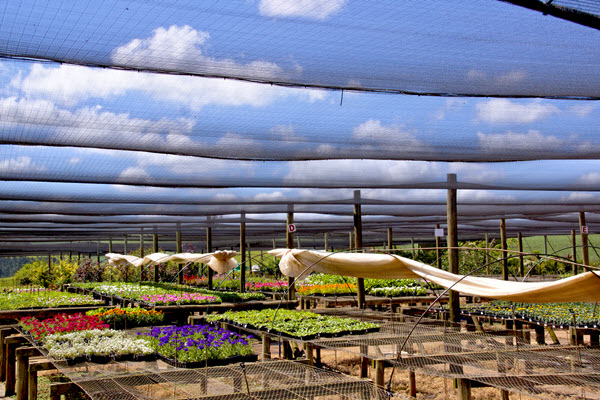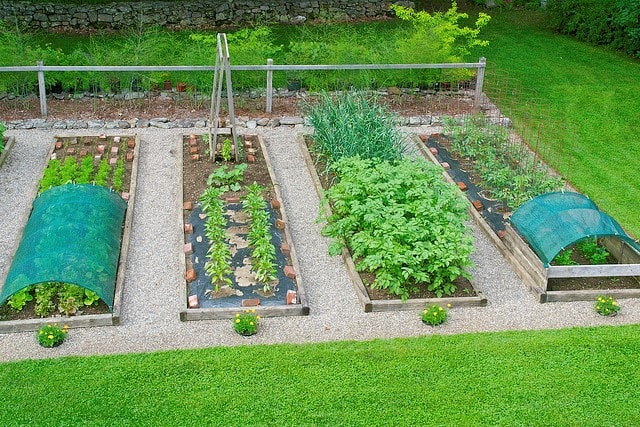
Upholding a thriving garden in Australia's harsh weather conditions can prove to be a challenge. Thankfully, there is a solution! Many gardeners have chosen to incorporate shade cloth, a durable and woven material, in their gardens. Shade cloth can be used to protect their plants against the harsh Australian sun rays and elemental exposure.
Shade cloth is primarily used for dust control and outdoor advertisements in the construction industry, however, its use as a handy addition has seen it increase in popularity amongst gardeners.
This is because shade cloth is a durable material that can provide protection for 10-20 years (depending on material choice, location, weather etc). It is also an inexpensive and effective method that can help ensure a fruitful of harvest. In addition to the protection benefits, shade cloth comes in a range of thicknesses, styles and colours to suit the requirements of your patio plants and the style of your outdoor garden area.
Request FREE Patio Quote
Call Us On (08) 9493 7115

How Can Shade Cloth Be Used to Help My Garden?
Plants require the sun to grow and blossom, but each plant will vary in how much light and heat they ideally require. When Australia really starts to hit the hot Summer months, shade cloth can provide gardeners with a well-needed cooler environment to spend their time in tailoring their garden and the amount of light penetration each plant is receiving.

Where Can I Use Shade Cloth in My Garden?
- You can hang shade cloth over freestanding covers, ferneries and pergolas.
- Shade cloth can be used to create shade houses.
- Shade cloth can be used inside your transparent greenhouse (if your plants require warmth but are sensitive to direct sunlight).
- Shade cloth can be used for raised garden beds that have solid arching.
- You can drape, cover and wrap shade cloth to any requirement that you have.
Shade cloth can be found in a wide range of UV stabilised densities; this will allow a tailor-made shade solution based on each individual plants requirements. Most retailers offer densities of 30 percent, 50 percent, 70 percent and 90 percent. The 70 percent cloth is great for covering pergolas and gazebos; 30 percent is also popular to encourage plant growth.
Which Shade Cloth Will Be Best For My Garden?
The shade cloth you should choose to use really depends on the environment you have selected to grow your plants in. Some plants prefer certain density percentages and coloured shade cloths while others are not as picky. We suggest you seek advice from a plant nursery to determine your plants' requirements.
Can You Use Shade Cloths For Greenhouses?
One of the best benefits of a greenhouse is the garden cover and temperature regulation it provides during summer and winter. Ensuring plants have adequate protection and environmental conditions is imperative for their growth. Adding shade cloth to your greenhouse structure is a cheap and easy way to help your plants be happy and thrive within shade houses.

What Are Shade Cloths Made Of?
Your options can choose either knitted shade cloth or woven shade cloth. Both options work for a variety of plants but there are important components that will make a difference when it comes to cloth material, density, how heavy duty the shade cloth is and the effect it will have on your garden cover.
Knitted Shade Cloth
Made of a polyethylene blend, this knitted shade cloth is made to be lightweight but still durable. The main goal is to reflect any heat and light to keep plants cool and limit sunlight while providing light shade.
Things to know about knitted shade cloths include:
- Easy installation.
- Best for general use.
- Comes in a variety of colours.
- It will not unravel if it has a hole due to the way it’s built.
Woven Shade Cloth
Woven shade cloth on the other hand is more heavy-duty and perfect for full garden cover during winter. Made from 100% polyethylene, this dense cover allows heat build-up, which is perfect for plant protection during winter. It also provides more sun coverage than its counterpart, but it is heavier so may be harder for an easy installation.
Things to know about woven shade cloths:
- The material is heavier, so it may be harder to install.
- Primarily used for greenhouses.
- Limited colour options.
- It will unravel if a hole occurs in the material.
What Is Density Percentage?
Shade cloth is either knitted or woven. We recommend using knitted shade cloth for gardens as the difference will permit different levels of sun penetration and heat. In addition to the level of UV protection your plants require, you should consider what percentage of sun blockage is ideal for the plants that you want to grow in your garden.
- 30 percent to 60 percent: Ideal for vegetables, fruit trees and nurseries. Please note that shade cloth will also offer your vegetables and fruit trees protection from birds that enjoy fruits and vegetables as much as we do.
- 70 percent: Generally implemented in greenhouses.
- 90 percent: Ideal as a ground cover to discourage weed growth.
Shade cloth will dissipate a large level of the head load that your plants would be receiving if they are not adequately covered. Shade cloth in the garden should be considered an investment due to the reduction of energy and water costs that are required during summer to protect your garden.
Request FREE Patio Quote
Call Us On (08) 9493 7115
FAQs
What Colour Shade Cloth Is Best?
The colour of your shade cloth depends on the photoreceptor requirements of your garden plants. Green and black shade cloths are better for tomatoes, lettuce, squash and turnips while white shade cloths are more suitable for apple, fig and guava trees.
What Percentage Shade Cloth Should I Use?
Depending on the purpose of your shade cloth use, you can choose the lower-density shade cloths to promote plant growth and the higher-density shade cloths for areas that require more shade. High-density shade cloths are great for covering pergolas and greenhouses.
Does Shade Cloth Keep Rain Out?
No, shade cloths generally don’t keep the rain out, they are made from non-100 % or blends of polyester.
Does Shade Cloth Reduce Heat?
Yes, choosing a low-density, knitted shade cloth, in a light colour gives your plants protection from the heat.
What Is the Best Shade Cloth for a Vegetable Garden?
Green knitted shade cloths with a 30% density are ideal for a vegetable garden. Letting in an ample amount of light and heat helps promotes vegetable growth.